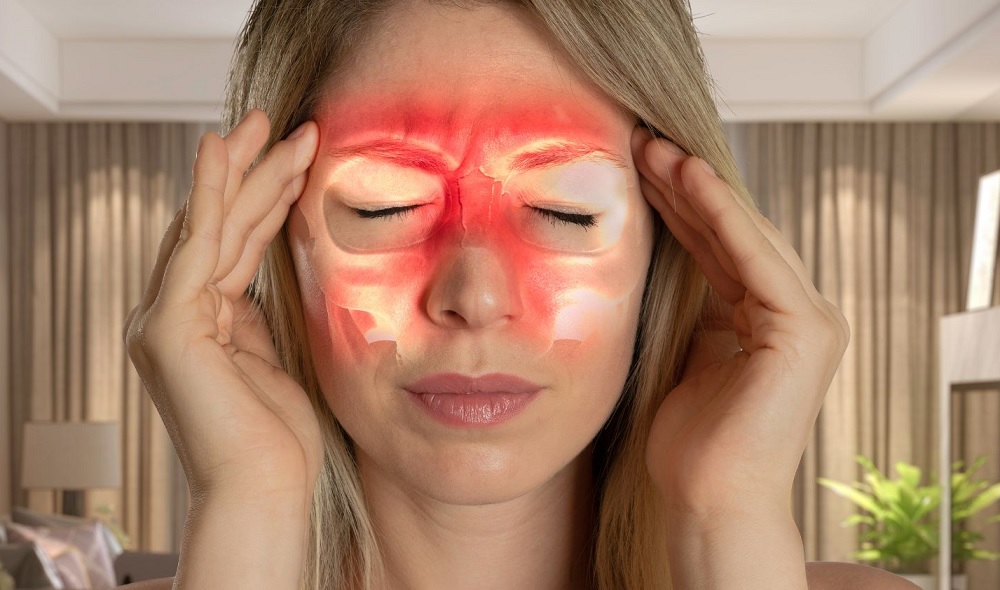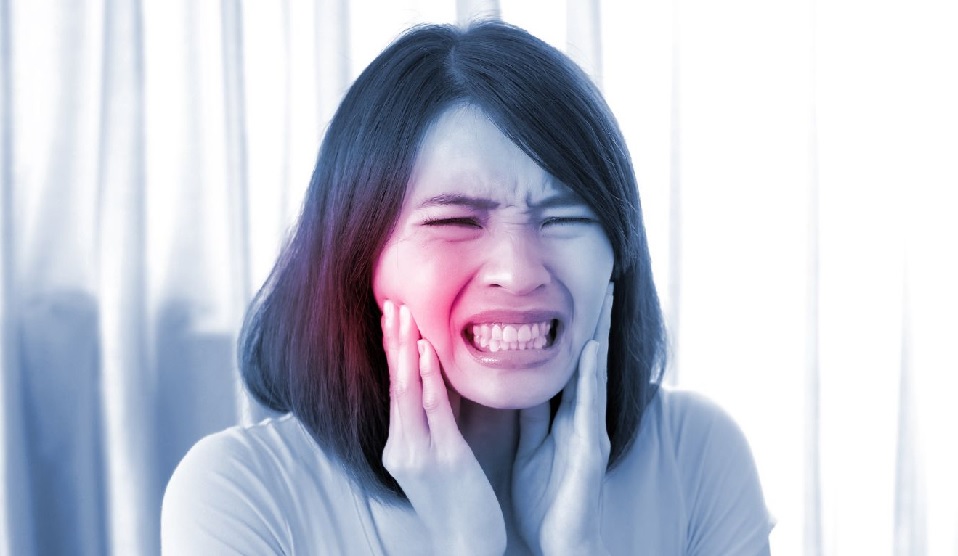Last Updated on: 4th December 2024, 05:10 pm
It is possible to have a toothache that does not originate from the usual dental injury. Its cause may be outside the oral cavity, but very close to it. Where? It would be in the paranasal sinuses. Sinusitis or sinus infection tooth pain can be the cause of dental discomfort. Sinusitis symptoms as a rule are often accompanied by toothache. Generally, what is affected are the upper posterior teeth, located very close to the paranasal sinuses.
What is sinusitis?

It is the inflammation of the membranes of the nasal cavity, due to a bacterium or virus, that is, an infection. This facilitates the accumulation of mucus that produces pressure on the nerve endings and affects the root of one or more teeth.
What are the symptoms of sinusitis?
Some of the signs that warn of the presence of a sinus infection are:
-
- Headache
- Pain in the molars / upper teeth
- Abundant nasal fluid runny nose
- Bad breath
- Discomfort in the throat
- Sensation of nasal congestion
- Feeling of pressure in the head
Why does a sinus infection cause a toothache?

The paranasal sinuses are located around the nose. When they become inflamed due to an infection, such as sinusitis, they put pressure on the roots of nearby teeth, causing pain.
Nasal congestion, thick nasal discharge, and facial pain are part of the discomfort caused by a sinus infection. With the pressure that the upper teeth feel at the root due to the increase in accumulated mucosa, pain, and dental discomfort are likely to appear.
An article published in 2011 by the British Dental Journal points out that the maxillary sinus is the recurrent site of a sinus infection and the cause of dental pain.
How to know if it is a sinus toothache or a dental infection?
Identifying the difference between a tooth/toothache stemming from a sinus infection and regular dental discomfort is critical in determining the course of treatment. A helpful sign is when a sinus toothache is felt in the upper molars and affects several teeth. Also, you may feel low in energy or feverish. You may also experience increased pain when bending over or jumping, as sinus pressure changes with movement. When you have a resting position (sitting or lying down), the pain decreases.
In addition, a sinus infection interferes with the sense of smell and causes nasal obstruction on one side only or nasal congestion, and nasal discharge occurs on one side. A toothache with an origin other than a sinus infection can be more intense and centered on a single tooth. Regularly, the discomfort is intensified by cold or very hot food/drinks. If you have signs of a tooth/toothache related to a sinus infection, you need to seek medical attention to receive the required treatment.
Can a dental infection cause a sinus infection?
Although they are two different conditions, a dental infection can be related to a sinus infection. An untreated deep cavity or periodontal disease that did not receive timely attention, allows the accumulation of bacteria and the formation of abscesses, a condition that leads to a dental infection that if not treated promptly extends to the root of the teeth and spreads into the surrounding tissues, including the sinuses. As a result, you will have a secondary sinus infection.

What are the symptoms of a secondary sinus infection?
-
- Facial pain
- Headache
- Nasal congestion
- Thick, yellowish nasal discharge.
In 2012, through a review study, it was found that 40% of chronic maxillary sinus infections were the consequence of a dental infection.
How long does a sinus infection tooth pain last?
Dental pain and discomfort linked to a sinus infection may be present as long as sinusitis is active. Sinusitis usually lasts less than four weeks. If the situation is more complex, this health condition can last for 4 and 12 weeks. If the sinus infection is not treated promptly it becomes chronic; of note, the discomfort can exceed four months.
What is the treatment for sinusitis?
Treatment for sinus infection (sinusitis) depends upon the cause and severity of the condition. In many cases, sinusitis can be treated with simple measures at home, but in more complex situations, it may require medical attention.
In mild cases, home treatments and adequate hydration facilitate the management of the discomfort:
-
- Warm compresses: Apply compresses in the area of the nose and forehead; it helps reduce pressure by relieving discomfort in the paranasal sinuses.
- Sleep: Rest increases the body’s natural defenses against infection.
- Do nasal washes: You can wash your nasal cavity with salt water using a syringe. These washes hydrate the nasal mucosa and reduce the intensity of the discomfort.
- Inhale vapor: This allows for the moistening of the mucosa of the sinus cavity and will decrease pain. It is recommended to put a bit of mint in the water since it has decongestant properties.
- Head position: This influences the relief of sinusitis. Placing the head in an elevated position improves ventilation and airflow. It is recommended to take into account the position of the head, particularly when sleeping. Additionally, if you have a partner or someone else around you, you can ask them to try some massages at pressure points that relieve toothache.
If symptoms persist or worsen, it becomes necessary to seek medical attention. In cases of bacterial sinusitis, antibiotic medications may be prescribed to fight the infection. To reduce nasal congestion and inflammation, decongestants and nasal corticosteroids can be used. In more serious or recurring situations, nasal irrigation or surgical procedures may be used to drain obstructed sinuses.



When to seek professional attention?
Identifying the origin of a toothache is essential to determine what treatment course to follow. It is recommended to take into account the symptoms that warn of a sinus infection and likewise opt for home treatments that facilitate the management of this health condition or seek medical assistance if the case requires it. If the toothache is the result of a dental injury, it will be necessary to consult a dentist to avoid an infection that spreads through the tissues of the upper jaw and leads to a secondary sinus infection.
Frequently Asked Questions
Maintaining adequate hydration through sufficient fluid intake may be beneficial in reducing sinus pressure, which in turn may help reduce the dental pain associated with sinus pressure. The use of steam is a common technique to clear congested nasal passages. For optimal results, opt for steam infused with mint. Peppermint is recognized to have decongestant properties and can provide pain relief.
Usually, toothaches from a sinus infection tend to last for about 7-10 days. In case your symptoms persist beyond this period, it is recommended to contact a health professional as there may be other underlying causes related to your dental pain.
Typically, sinus pain tends to be a constant, dull ache in contrast to pain from an abscessed tooth, which tends to increase in intensity. If you lightly tap an abscessed tooth, you will likely experience a sharp jolt of pain.
A diet high in sugar can increase the risk of cavities while a balanced diet can promote healthy gums and teeth.
This implies that bacteria can spread from the sinuses to the gums and teeth, and vice versa. Due to the close relationship between the sinus cavity and the teeth, it is essential to understand that disorders in one of these areas can also signal the presence of a problem in the other.
Contact Us
If you have any questions about how to relieve sinus infection tooth pain or other topics, you can contact us at Channel Islands Family Dental as well as our page on Facebook. We look forward to your visit and we will make a timely diagnosis. Our dentists in Oxnard, Santa Paula, Ventura, Newbury Park, and Port Hueneme will be able to guide you toward the best treatment to take care of your health and give you back your best smile.
Bibliography
- Cronketon Emily (Octubre 4 de 2022) Can a Sinus Infection Cause a Toothache? / https://www.healthline.com/health/dental-and-oral-health/sinus-toothache
- Echeverry Daniela (July 6, 2023) Toothache? The cause may be sinusitis / https://mejorconsalud.as.com/dolor-muelas-la-causa-puede-sinusitis/
- Mayo Clinic (s.f.) Sinusitis and tooth pain / https://www.mayoclinic.org/diseases-conditions/acute-sinusitis/multimedia/sinusitus-and-tooth-pain/img-20186076
- MedlinePlus (May 30, 2022) Sinusitis / https://medlineplus.gov/spanish/ency/article/000647.htm
- Middlesex Health (n.d.) Sinus infection and toothache: any relationship? / https://middlesexhealth.org/learning-center/espanol/preguntas-y-respuestas/infecci-n-de-los-senos-paranasales-y-dolor-de-muelas-alguna-relaci-n
- Nall Rachel (Febrero 17 de 2023) Sinus infection and tooth pain: What is the connection? / https://www.medicalnewstoday.com/articles/sinus-infection-tooth-pain


